Framed certificates printed in the style of medieval manuscripts and adorned with seals and signatures are much sought after in the Middle East. They are a way of acquiring prestige, getting jobs and, in some cases, laundering a person’s reputation. Thus, when it emerged recently that two Iraqi politicians had received bogus degrees, one unsurprised Twitter user quipped: “Only two?”
Iraq’s former interior minister, Qasim al-Araji, who rose to prominence through the notorious Badr organisation, received a master’s degree while Ahmad al-Ubaidi, minister for youth and sports, was awarded a doctorate. Both politicians “graduated” from the privately-owned Aalborg Academy of Science in Denmark, an unrecognised institution that pretends to be a university.
Iraq isn’t the only country where fake degrees are popular, of course. Unbelievable numbers of politicians in other Arab countries claim to have doctorates – some real, some not – but the problem runs much deeper than that. Fraudulent certificates also allow people to get jobs they don’t deserve and with some types of work this can put lives at risk.
In Europe, for example, a fake Norwegian university has issued degrees in nursing to people in Egypt. Elsewhere in the world there are occasional discoveries of unqualified people practising as doctors, and similar things have happened in aviation. Last June, Pakistan International Airlines grounded 150 of its 434 pilots after they were found to have “bogus or suspicious licences”.
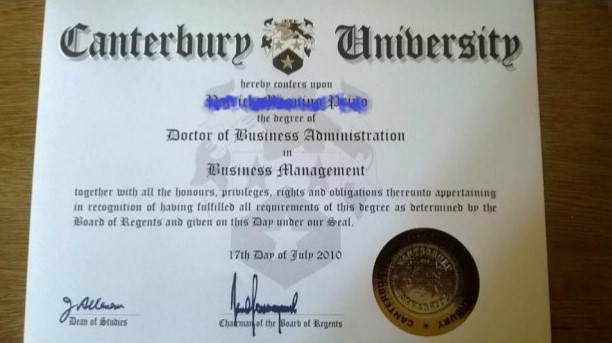 |
Certificates for sale
Fraudulent qualifications are “increasingly widespread” in the Arab Gulf states according to the Emirates Center for Strategic Studies and Research which organised a symposium on the issue last year. The scale of the problem is hard to quantify precisely but in Kuwait, with a population of just over four million, hundreds of fake degrees have come to light during the last couple of years.
An Egyptian who ran several private training institutes in Kuwait was alleged to have sold 600 degrees to “high profile clients”. The forged certificates were expensive – 12,000-20,000 dinars ($39,000-$65,000) – but they carried official stamps which the seller had somehow obtained from the relevant Egyptian universities. The man’s customers were said to include three interior ministry officials, an army officer and a member of the royal family.
Just a few months earlier, a newspaper investigation in Kuwait had discovered an office where college degrees could be bought for around 9,200 dinars ($30,000) and high school diplomas for around 2,500 dinars ($8,200). No studying was required and the office was said to have sold 250 degrees over a 13-year period – some of them to people “holding high positions in banks and companies”.
In one alarming case last year a 21-year-old Kuwaiti was arrested for posing as a qualified pharmacist. Based on a fake certificate, he had obtained a licence to open a chain of 12 pharmacy shops, but no one in government offices appears to have checked his credentials at the time of his application.
Degrees at a distance
Degree fraud usually occurs in one of two ways – with a forged certificate from a real university or a worthless one from a fake university. Buying a forged certificate is a clear case of deliberate cheating, but with fake universities the ethical situation is more blurred because they maintain a semblance of academic teaching.
Typically, fake universities advertise “distance learning” courses with teaching materials provided online but their websites are vague about what students must do – apart from paying the fees – in order to graduate. They usually indicate that some essay-writing is needed but make no mention of exams. They also give discrete signals that the amount of academic work involved is negotiable: parts of the course can be replaced by “credits” for non-academic “life experience” – a term that invites all sorts of interpretations other than actual study. While it’s possible that some “students” are tricked into believing they have found an easy way of gaining a qualification, it’s hard to imagine that most are unaware of being complicit in a scam.
The basic purpose of these fake universities is to make money. Sometimes known as diploma mills, they have been around for a long time, especially in the United States, but the development of the internet has facilitated their activities and widened their potential market.
FURTHER READING:
Degrees of deception: how fake universities target the Middle East
One pioneer in this field was the late Maxine Asher, creator of the American World University. Ms Asher herself had studied at several universities (real ones) before embarking on this venture and had also spent many fruitless years searching for the mythical lost continent of Atlantis – an enterprise that led to her being dubbed “the female Indiana Jones”.
“I simply know we will find it because I am psychic,” she told the New York Times before setting off on one of her Atlantis-seeking expeditions. “Oh God, how strong the vibrations are these days, and I know that the highly civilised people of Atlantis also were very psychic.”
Her American World University, founded in 1990, proved more successful than her hunt for Atlantis – at least financially. By 2013 it claimed to have awarded more than 10,000 degrees to students in 40 countries, and one of its “graduates” was said to be a Saudi prince.
In 2004, when two reporters from the Chronicle of Higher Education visited the headquarters of her university – based at the time on the fourth floor of an apartment block in San Francisco – all they found was Ms Asher, four secretaries and a fax machine. This is a hallmark of fake universities. They don’t need a campus with lecture theatres, libraries, laboratories, etc, because the courses they advertise involve distance learning. That cuts their costs and means they can charge lower-than-normal fees, making them very attractive to hard-up students in faraway countries.
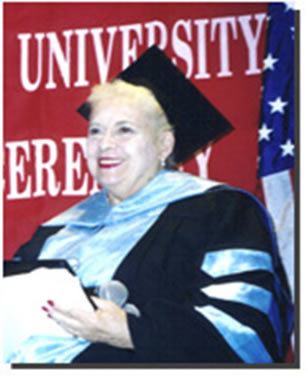 |
Distance learning can be a valid form of education, though much depends on the way it is done. Many countries have officially-recognised “open” universities where much of the teaching is done online, with the aim of helping people from disadvantaged backgrounds gain a qualification while earning an income. There is clearly a demand for distance learning and the coronavirus pandemic has given it a further impetus: many countries switched to online teaching when schools and universities were closed to avoid spreading infection.
The existence of respectable forms of distance learning is a boon for unrecognised universities because it makes their teaching methods seem more credible. In many cases their actual teaching is minimal – just enough to keep up the pretence that they are not simply selling degrees – and there’s no assurance of educational standards because unlike recognised universities they have not been through a proper accreditation process.
‘Start your own university’
In the absence of official accreditation for her American World University, Maxine Asher came up with an alternative solution. In 1993 she created her own accreditation body, the World Association of Universities and Colleges (WAUC), which duly accredited her university and, before long, began selling accreditation to other bogus universities. For a payment of $1,200 they would be allowed to display the WAUC logo on their website. Using the logo, she advised, would increase enrolment and “give students confidence in your school”. By 2010, some 70 “universities” had received her accreditation.
But that wasn’t all. Ms Asher’s WAUC also offered support and encouragement to those not yet fortunate enough to possess a university themselves. “Start your own,” it urged. “Expert help available. Licensing, accreditation, obtaining qualified professors, writing catalogues and handbooks can also be provided. Reasonable rates.”
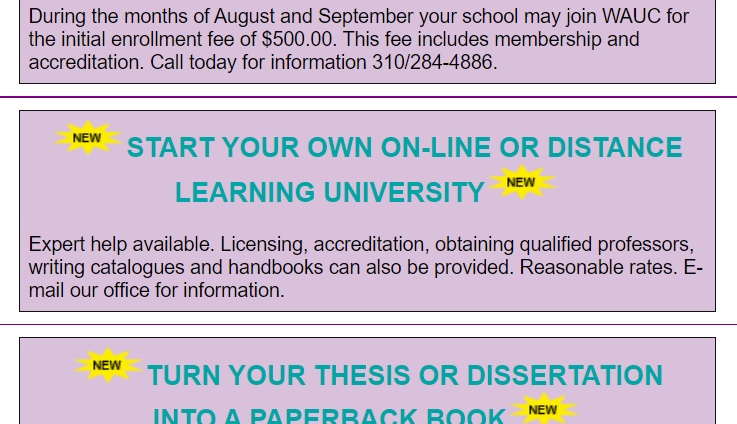 |
Ms Asher died in 2015 at the age of 84 and her mantle passed to a new generation of fake university proprietors. While a few still claim WAUC accreditation on their websites today (among them the so-called Ibn Rushd University in the Netherlands) there is now an abundance of other “accreditation” bodies which, despite their official-sounding names, are often impossible to trace through Google searches.
Deception techniques
Spurious accreditation isn’t the only trick for creating an appearance of official recognition. Some fake universities boast of being legally constituted – which simply means they have registered themselves as a business. Although many countries prohibit businesses from including the word “university” in their name without special permission there are ways of circumventing that. Some adopt foreign names – “université” or “università” – while some settle for less specific terms such as “academy” (though they still issue university-type “degrees”).
Another device is to register the name in a place which has no restrictions and then operate “branches” elsewhere. This was the method recommended by Ms Asher in a phone conversation overheard by visiting reporters from the Chronicle of Higher Education. Speaking to a WAUC member named Tariq whose “university” was having trouble with the British authorities, she advised him to register it in Mississippi: “Then you should be able to use the name ‘university’,” she said. “If you get an office in Mississippi and you’re only operating a branch office in London, then that should be all right.”
Ms Asher was familiar with such problems – and how to sidestep them. In the US there were several legal attempts to close her university down, but she fended them off by shifting its headquarters around among the various American states.
Tricks with internet addresses can also be used to make fake universities look real. In more than 20 countries the websites of recognised academic institutions have “.ac” as a suffix in their domain name. But there’s another way to get an academic-looking “.ac” address, since “.ac” is also used for websites registered in Ascension Island, a remote British possession in the Atlantic that has become a popular location for fake universities’ websites. There’s a small difference, though, because real academic websites have an additional suffix to indicate their country. Thus Oxford University – the real one in England – is “oxford.ac.uk” but “oxford.ac” would be a fake in Ascension Island.
Certifying the certificates
Some of the fake universities have also developed a ruse to make their worthless certificates seem valid. For an additional fee they can arrange to have them “attested”. An advertisement for “Oslo International University” explains that its certificates can be issued with “approval” stamps from the Norwegian foreign ministry, the justice ministry and the embassy of the recipient’s home country. Others, such as the “Bay Ridge University” in Norway and “Van Holland University” in the Netherlands have offered a similar service.
In doing this, they misleadingly exploit a legal device known as notarial confirmation. The stamps – on the back of the certificate – are genuine and certainly look impressive, but they merely confirm that the signature on the front of the certificate belongs to the person purporting to have signed it. They don’t authenticate the degree itself.
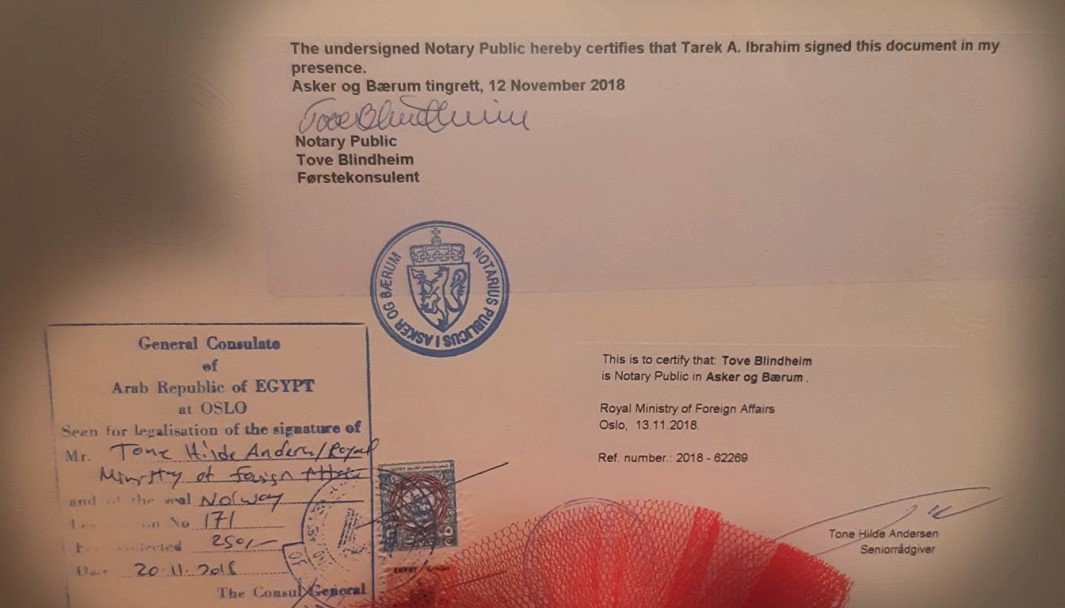 |
Bay Ridge, Van Holland and Oslo International are among a number of unrecognised “universities” in Europe that focus on attracting clients from the Middle East. Their websites are usually in English and Arabic, and they are mostly run by Arab expatriates. Eighty percent of degree “students” at the Danish Aaalborg Academy have an Arab nationality, according to its website.
Having a European base gives such organisations a veneer of respectability, but they typically rely on promotion by agents in the target countries. This was another of the techniques developed by Maxine Asher at her American World University. She hired local representatives to recruit new students, offering 50% of any fees they brought in. Such hefty commission payments meant less money for Ms Asher but they gave her agents a strong incentive and, as she told reporters, “Fifty percent of something is better than nothing.”
Worthless degrees from the Bay Ridge University are promoted on Facebook by an account called Go Degree which posts in Arabic and uses Libyan and Egyptian contact numbers. Go Degree lists a scale of charges for certificates from Bay Ridge ($950 for a doctorate) and says they can be “notarised” on request by the Norwegian authorities and the embassy of the student’s home country. Students can obtain a doctorate by writing a thesis in “no more than six months and not less than three months”. That is an abnormally short time for a thesis and Go Degree adds that these are “professional degrees, not academic degrees” – a tacit admission that they lack academic value.
Go Degree also invites potential students to “ask about the experience equivalency system”, an alternative route for acquiring a Bay Ridge certificate. As with “life experience” at other fake universities, this hints at ways of minimising the academic work involved.
Besides recruiting students through social media, fake universities use privately-run colleges in the Middle East as outlets for their degrees. A sign above a doorway in Iraq shows one such college advertising degrees from the fake Aalborg Academy. Aalborg’s logo is in the top left corner and the sign reads:
The High Academy
For Scientific and Humanitarian Studies
Master’s and Doctorate
In participation with the Aalborg Academy of Science in Denmark
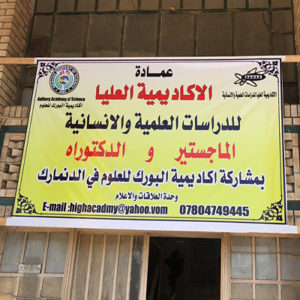 |
Similarly, at least two privately-run colleges in Egypt offer degrees from Oslo International University (not to be confused with the real University of Oslo). One of them, Horus Academy (not to be confused with Horus University a few streets away), purports to be the “sole agent” in Damietta province for what it inaccurately describes as the “Norwegian University of Oslo”. The prospect of a degree from Europe presumably helps to attract students and Horus Academy also hints that its students may be able to continue their studies in Norway.
Naming and shaming
For several years Muwafiq Fawaz al-Ruwaili, a former member of Saudi Arabia’s Consultative Council, has been waging a personal campaign against degree fraud. His technique is simple. He checks LinkedIn profiles and other online sources to identify people with “qualifications” from unaccredited universities, then names them on Twitter with the hashtag #هلكوني (“halkuni” – an Arabic expression of annoyance which literally means “they destroyed me”).
Hundreds have been embarrassed by his hashtag and some have revised their online CVs, but others have reacted angrily. According to Ruwaili the problem is greatest among expatriates working in the private sector, especially in such areas as management and finance.
 |
In principle, verifying qualifications should be the responsibility of employers. Certificates from recognised universities can be checked relatively easily, though clearly many employers don’t bother. Those who do can easily end up being fooled unless they also check the status of the university along with the certificate itself. For instance, the University of Wolverhamton (since closed down and not to be confused with the real University of Wolverhampton that has a “p” in its name) helpfully provided transcripts including instructions for “verifying” its degrees. Employers could find confirmation by entering the student’s registration number on its bogus website.
Government responses
The six Gulf Cooperation Council (GCC) states – Bahrain, Kuwait, Oman, Qatar, Saudi Arabia and the United Arab Emirates – collectively employ millions of expatriates from many different countries. Although most are unskilled workers there are many others in jobs that need qualifications. Their certificates come from a range of countries and institutions with varying educational standards, so even if their certificates are genuine it can often be difficult to determine how qualified the people really are. This is increasingly seen as a global problem due to the increased mobility of labour across national boundaries.
To clarify the situation, GCC states have developed systems for evaluating degrees from other countries and issue “equivalency certificates” for those they recognise as genuine and of a suitable standard. In the UAE, students intending to study at universities abroad are urged to check with the education ministry before starting a course, “lest their efforts be wasted”.
The UAE’s equivalence system does accept qualifications obtained through distance learning but lays down special requirements that should eliminate fake universities. For example, the institution issuing the degree must be officially accredited in the relevant country and the period of study and number of units in the course must be no less than for traditional methods of study.
Despite such efforts, though, the number of fraudulent qualifications that have come to light in the region suggests equivalence systems are far from watertight.
In the case of expatriates, verification of degrees and other qualifications can also be tied to the issuing (or renewal) of residence permits. Under rules introduced by Qatar in 2016, residence applicants with higher education certificates must obtain a letter from the relevant institution not only authenticating the certificate but also providing further information that could help establish whether the institution itself is genuine or not. The letter had to state whether the student was full-time or part time, where the student was studying, whether distance learning was involved, how long the course lasted (with start date and end date), and the location where exams were held. The rules also say that certificates “obtained via distance learning or an online programme will not be accepted”.
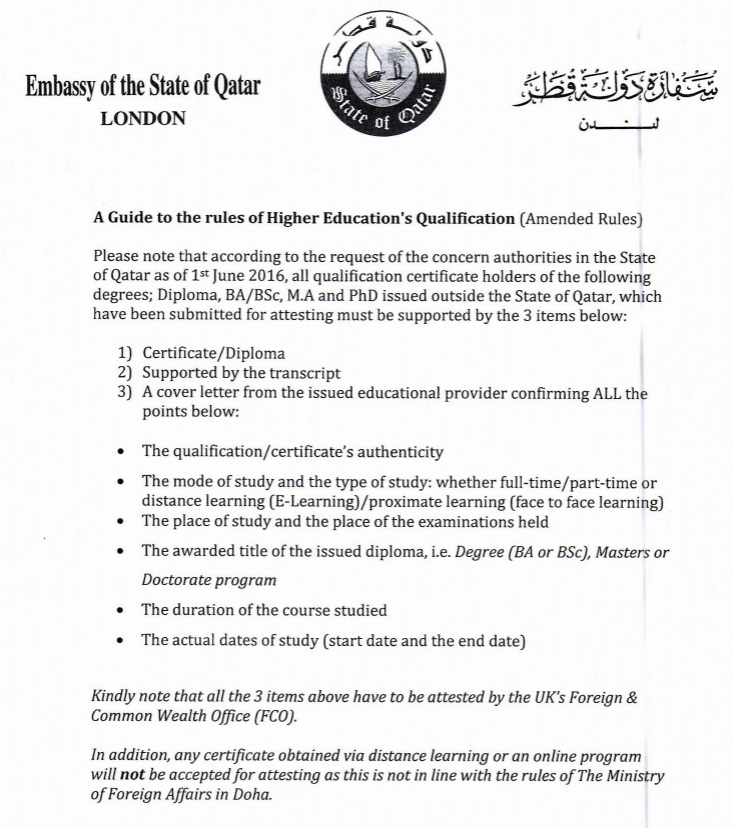 |
Digital degrees?
Kuwait recently suspended accreditation for Indians seeking to work in the country as engineers following the discovery of 160 cases of forged certificates. The result is that they will not be granted residence permits until the matter is resolved and those already working in Kuwait may be forced to leave unless they have certificates recognised by India’s National Board of Accreditation (NBA).
Kuwait’s move has brought complaints from Indians who claim to be properly qualified and blame flaws in India’s record-keeping. This is not an uncommon problem when it comes to verifying certificates because education systems are rarely static. India’s NBA wasn’t established until 1994 and there are said to be many working in Kuwait who obtained their certificates before it existed. Others studied at colleges that have since closed down and are thus no longer recognised. Institutions can also merge with others or change their name and academic status, so there’s a need for accurate records of the historical situation as well as the current status.
Another problem highlighted by the Indian engineers affair is the unreliability of paper documentation. The mass forgery of certificates only came to light as a result of the coronavirus pandemic, which prompted the Kuwaitis to shift their registration system online, and internationally there’s growing recognition that digital records are the way forward. Besides making it easier for people to prove their credentials, digital systems reduce the scope for fraud while disregarding “qualifications” from bogus institutions.
The need to combat fraud isn’t the only factor driving towards digitisation, however. In an increasingly globalised world people don’t necessarily work in the country where they graduated, and they need to be able to take their qualifications with them. As a starting point, that would require each country to have a reliable and publicly-accessible database of all the degrees awarded by its recognised institutions – and to some extent it’s already happening. In Britain, for example, Higher Education Degree Datacheck (HEDD) provides a centralised system that employers and others can use to verify degrees. HEDD has a secondary role in combating degree fraud and it holds data on more than 240 institutions that have been identified as bogus, but its main purpose is to provide a simple way of authenticating academic credentials.
Internationally there are various other initiatives, all aimed at making genuine qualifications more portable between countries. One of them is the Lisbon Recognition Convention which has been ratified by 54 states including almost all members of the Council of Europe. A similar initiative, intended for wordwide application, is the Global Convention on the Recognition of Qualifications concerning Higher Education established by UNESCO in 2019 after eight years’ deliberation. So far, though, it has only two signatories – Norway and Nicaragua.
There’s little doubt that secure digital certificates will eventually replace insecure paper ones – but that is still some years away. In the meantime, fake universities will continue reaping the profits from their bogus degrees.
● This article was first published by Culturico on 7 November 2020.

 RSS Feed
RSS Feed
